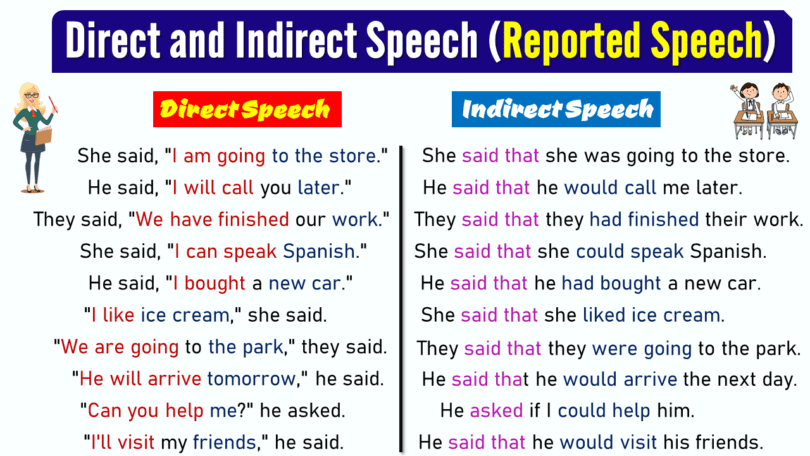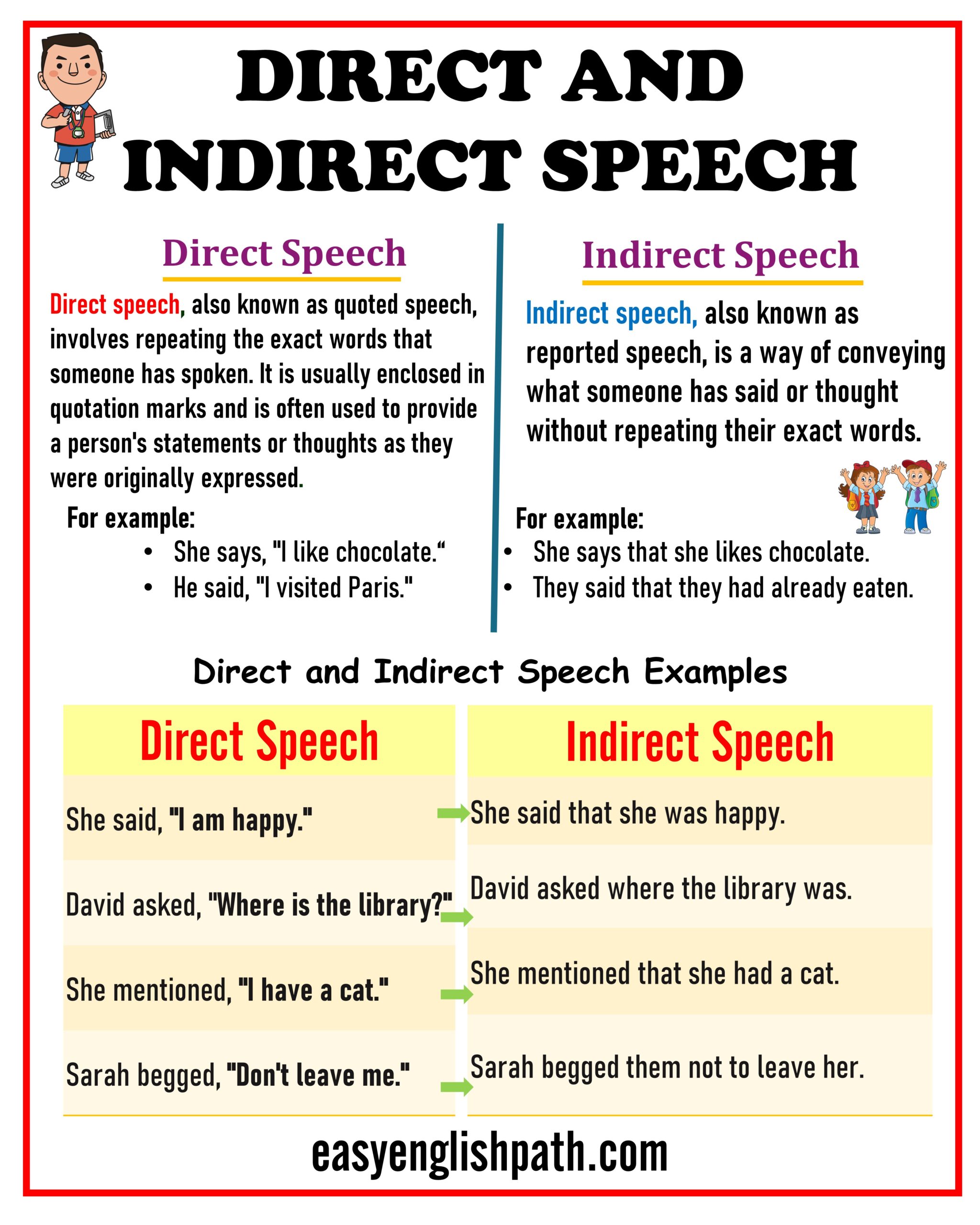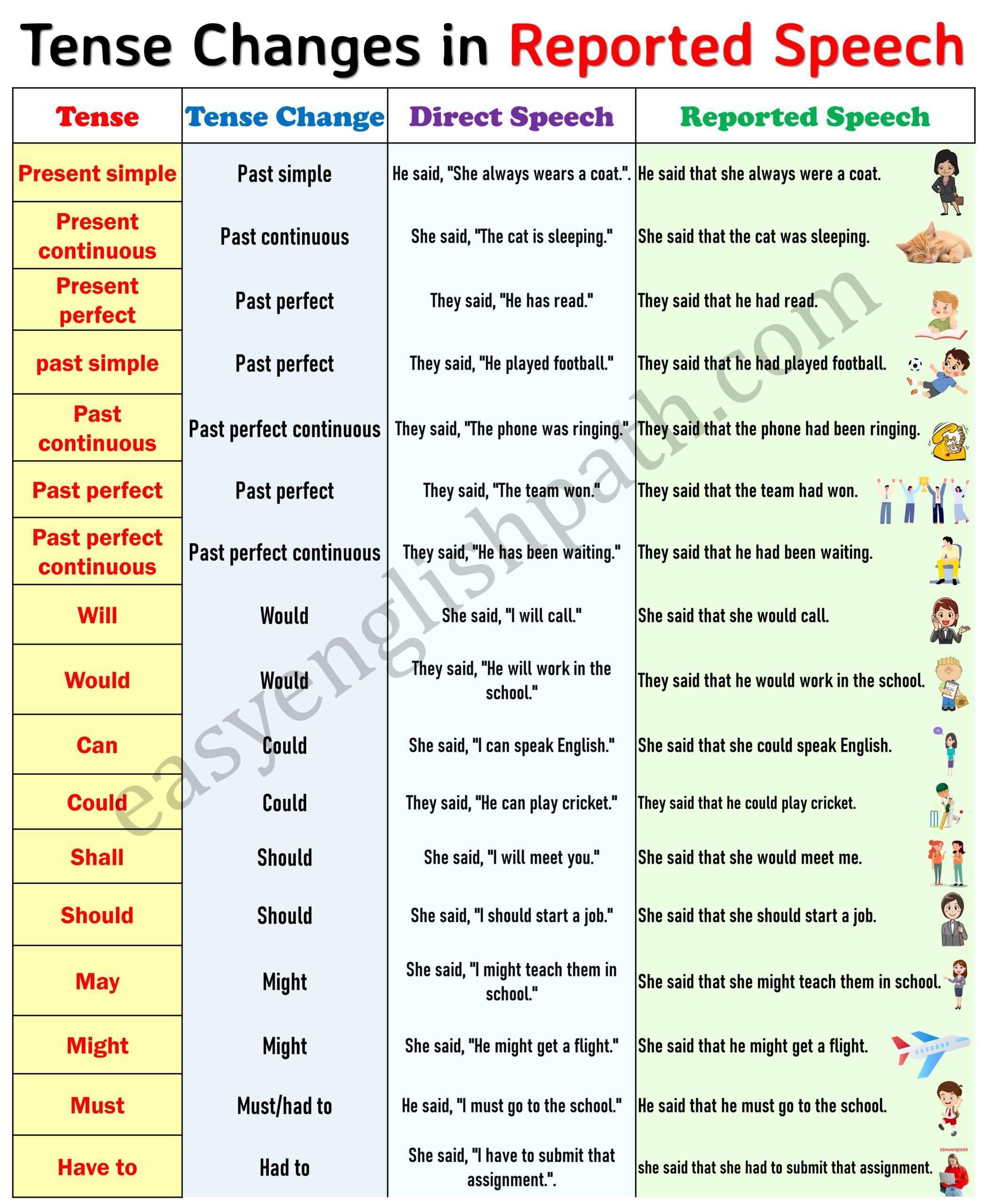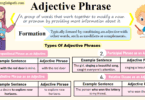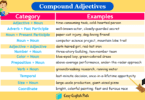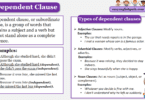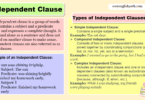Learning about Direct and Indirect Speech is like understanding how to share what someone said. Direct Speech is when you repeat exactly what someone said using quotation marks. Indirect Speech is when you tell what was said in your own words without using quotation marks. When changing from Direct Speech to Indirect Speech, you might need to adjust verb tenses and pronouns to make sense. We’ll go through examples and situations to make it easier to understand. Let’s discuss more about Direct and Indirect Speech.
Direct speech, is also know as quoted speech, it involves repeating the exact words that someone has spoken. It is usually covered in quotation marks and is often used to provide a person’s statements or thoughts as they were originally expressed.
- She said, “I will be there at 3 o’clock.”
- Sarah exclaimed, “I can’t believe we won the competition!”
- “Please pass me the salt,” said John to his sister.
Indirect Speech (Reported Speech):
Indirect speech, is also known as reported speech, it is a way of conveying what someone has said or thought without repeating their exact words. In indirect speech, the statement is reported as a paraphrase or summary, and it is generally introduced by the following verbs: “said,” “told,” or “asked.” When you use use indirect speech, remember that the tense, pronouns, and other elements will change to reflect the reporting context.
- Direct Speech: Sarah said, “I am going to the store.”
- Indirect Speech: Sarah said that she was going to the store.
- Direct Speech: “I love chocolate,” exclaimed Tom.
- Indirect Speech: Tom exclaimed that he loved chocolate.
Rules of Direct Speech
- Use Quotation Marks:
You should cover the spoken words within double quotation marks (” “).
- Punctuation:
You need to place punctuation marks (commas, periods, question marks, and exclamation points) inside the closing quotation mark when they are part of the quoted material.
She said, “I’ll be there on time.” - Capitalization:
You need to begin the quoted speech with a capital letter, regardless of how the original sentence began. - Reporting Verb:
You need to introduce the quoted speech with a reporting verb (e.g., said, asked, replied, shouted) that describes how the words were spoken. - Maintain the Speaker’s Words:
You are supposed to produce the speaker’s words again as correctly as possible, including any grammatical errors or informal language if they are part of the original speech. - Use Ellipsis (…) When Omitting Words:
If you need to exclude a part of the quoted speech, use an ellipsis (three dots: …) to indicate the omission. - Avoid Changing the Speaker’s Words:
You should strictly avoid to change the speaker’s words in a way that changes their intended meaning. However, you can add clarifications or explanations in brackets if needed. - Maintain Verb Tenses:
Keep the verb tenses of the quoted speech as they were spoken.
if the speaker said, I am going, you should maintain am going without changing it to was going.
- Maintain Pronouns:
Keep the pronouns same as used by the speaker with the original statement.
If the speaker said, I will do it, maintain I, and it.
Rules of Indirect Speech(Reported Speech)
- Reporting Verb:
You have to start the reported speech with an appropriate reporting verb (e.g., said, told, asked, explained, etc.) to indicate that someone is reporting what was said. - Change of Pronouns:
Change the pronouns in the reported speech to match the point of the reporting sentence.
if the original statement is I am happy, and you want to report it, you might say, She said she was happy.” - Tense Changes:
You should adjust the verb tenses to show the change in time from the original statement to the reported speech. The general rules for tense changes are as follows:
| Tense | Direct Speech | Reported Speech |
|---|---|---|
| Present Simple | “I like coffee.” | She said she liked coffee. |
| Present Continuous | “I am watching TV.” | He said he was watching TV. |
| Present Perfect | “I have seen that movie.” | They said they had seen that movie. |
| Past Simple | “I went to the store.” | She said she had gone to the store. |
- Reporting Time and Place:
You can change any words or expressions that are used to refer to time or place to show the view of the reporting sentence.
change today, to –> that day or here, to –>here
- Modal Verbs:
When you want to use modal verbs in reported speech, you should change them as follows:
| Modal | Direct Speech | Reported Speech |
|---|---|---|
| can | “I can do it.” | He said he could do it. |
| may | “I may go later.” | She said she might go later. |
| must | “You must finish.” | They said you had to finish. |
| will | “I will help.” | She said she would help. |
| shall | “Shall I come?” | He asked if he should come. |
- Reporting Questions:
When you want to report questions, use the word if or whether in order to introduce the reported question. You should change the word order and use the appropriate question word if necessary.
Are you coming? becomes She asked if I was coming. - Imperative Sentences:
We can use report imperative sentences using the verb to or that.
Close the door becomes She told me to close the door or She said that I should close the door. - Direct Speech in Quotes:
You should cover the reported speech in quotation marks if you want, but this is not always necessary in indirect speech. - Punctuation:
You should use a comma to separate the reporting verb from the reported speech. Also, use a period at the end of the reported speech or a question mark if it was originally a question. - No Change in Modifiers:
Do not change the modifiers or adverbs in the reported speech unless they are related to time, place, or demonstratives. - Tense Changes Rules in Reported Speech:
Tense changes in reported speech, also known as indirect speech, is basic aspect of English grammar. in this process, the verb tenses are shifted when you report what someone else has said. The main key is very important to understand is the relationship between the original statement and reported version when you want to change the verb tenses.
| Direct Speech | Reported Speech | Tense |
|---|---|---|
| She says, “I like chocolate.” | She says that she likes chocolate. | Present Simple |
| He said, “I visited Paris.” | He said that he visited Paris. | Past Simple |
| They say, “We are working on a project.” | They say that they are working on a project. | Present Continuous |
| She said, “I was studying all night.” | She said that she had been studying all night. | Past Continuous |
| He says, “I have finished my homework.” | He says that he has finished his homework. | Present Perfect |
| They said, “We had already eaten.” | They said that they had already eaten. | Past Perfect |
| She says, “I will meet you tomorrow.” | She says that she will meet you tomorrow. | Future (will) |
| He said, “I am going to travel next week.” | He said that he is going to travel next week. | Future (going to) |
Direct and Indirect Speech Examples
- Direct Speech: She said, “I am happy.”
- Indirect Speech: She said that she was happy.
- Direct Speech: He asked, “How old are you?”
- Indirect Speech: He asked her how old she was.
- Direct Speech: Mary exclaimed, “I won a prize!”
- Indirect Speech: Mary exclaimed that she had won a prize.
- Direct Speech: John told his friend, “I like ice cream.”
- Indirect Speech: John told his friend that he liked ice cream.
- Direct Speech: They shouted, “Let’s go to the park!”
- Indirect Speech: They shouted to go to the park.
- Direct Speech: Sarah whispered, “I need help.”
- Indirect Speech: Sarah whispered that she needed help.
You May Also Like This

